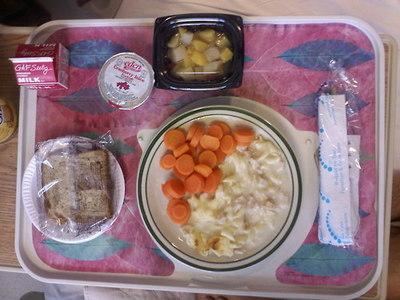£5 a day to feed an NHS patient? A closer look at hospital food data
The past year has seen passionate debate about the performance of the NHS after the Health Secretary proposed some wide-ranging reforms.
Yesterday it was the issue of hospital food expenditure which hit the headlines. The Telegraph quoted figures which apparently showed significant variance in the sums of money spent per meal by Hospital Care Trusts around Britain.

The Telegraph suggested that "at least 30 hospital trusts, or one in ten of the total," are feeding patients on less than £5 per person per day while others are spending up to £22.31.
The figures were provided by the NHS Information Centra (NHSIC) and were added to the House of Commons library yesterday and are available online at http://www.hefs.ic.nhs.uk/DataFiles.asp.
Looking at the data it is clear that the picture is incomplete, as figures haven't been provided by some trusts. Other trusts have partially returned data; for example Sheffield Foundation Trust provided figures for the amount spent and wasted per patient, but had no numbers on the total costs of food provision.
At the lower end of the spectrum, Western Sussex Hospital Trust spends the least on meals (£2.57 per day person) but — as the Telegraph acknowledges later in its article - the figure may be artificially high.
The Trust claims that their figures do not include the staffing costs associated with the preparation, cooking and serving of food; only ingredients. The NHS Information Centre meanwhile has said that its data covers these costs. This may cast some doubt about how comparable these figures are.
However when it comes to other low-spending trusts such as Harrow (£2.75) or North Somerset (£2.76) similar objections don't seem to have been raised.
The Telegraph also claims that "some trusts [are] spending over £20 a day on each patient." From our research we found only Wiltshire Primary Care Trust to be exceeding the £20 figure.
What is less clear is how the Telegraph arrived at its figure to claim that the average daily spend per patient is £5.
Using the figures published by the NHS we calculate that figure to be £8.50 (a total daily spend of £2,738 divided equally between the 322 trusts for which there was data). This figure falls closer to the £8.58 average published by the NHS in October.
Meanwhile, the figure for overall spending on hospital food is said to amount to £500 million annually. From the NHSIC data we can see that £473 million of spending was declared by the 290 trusts for which there is data, meaning that the total may well top £500 million once the remaining 91 trusts are factored in.
The Telegraph goes on to calculate that in some hospitals 1 in 5 meals are uneaten. On the basis of the NHSIC date this figure is correct and it may be noted that for the Sheffield Health and Social Care NHS Foundation Trust the rate is as high as 1 in 4. However, it should also be recognised that the average is just 7.17 per cent, or around 1 in 14.
Back in November it was reported that £22 million worth of food was thrown away in the past year. These latest statistics would seem to suggest that wastage is significantly higher.
Taking the £8.61 average food expenditure per trust per day and dividing it equally between three meals gives the average cost per meal of £2.83.
Using the £500m given for total food costs, we can therefore calculate that the NHS served 176.7 million meals (official NHS estimates place this at 133.7 million, based on 360 of 382 trusts). If 7.17 per cent of 176.7 million of these were wasted, then we'd be left with a figure of 12.7 million uneaten meals, and if each cost £2.83, then some £35.9 million would be wasted.
There is clearly quite a large difference between this figure and the one provided in November.
Finally, the Telegraph claims that 200,000 patients are discharged each year from hospital malnourished. It is unclear where this statistic is from. However, an article in the Telegraph from January 2010 cited an identical figure which indicates that particular statistic may not be very recent.
Full Fact will keep its eyes open for any news statistics on malnutrition in hospitals.